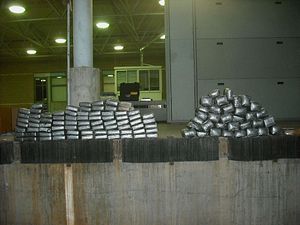Last week Chinese authorities executed two Korean citizens for drug smuggling. The execution might hurt recently improved Sino-South Korean relations.
It was reported that the South Korean government asked China to postpone the execution on humanitarian grounds, but Beijing went through with the execution just nine days after it informed Seoul that the Koreans would be put to death.
An unnamed source from South Korea’s Ministry of Foreign Affairs told the South Korean daily Chosun Ilbo that high level officials, including the Korean ambassador to Beijing, met with their Chinese counterparts in a bid to have the sentences commuted.
However, Beijing said the decision was made according to Chinese laws and regulations, Chosun Ilbo added.
At home, the South Korean government has come under some criticism for allegedly not doing enough to save its own citizens from being executed. South Korea’s two major political parties immediately blamed the Korean government as well.
Park Dea-chool, a spokesman for the ruling Saenuri Party, said in a press release, “Even though the government is saying it tried its best to save those two, there still needs to be more explanation on this case.”
“Since life is always most important thing, the government should have tried more to save them even though those two committed severe crimes in a foreign country,” Park added.
Yoo Ki-hong, a spokesman for the opposition New Politics Alliance for Democracy (NPAD), also criticized the government, saying that the government should be blamed since it acted passively in order to maintain good diplomatic ties with China.
China’s executions of foreign nationals have often sparked controversy.
When Beijing executed a British citizen, Akmal Shaikh, in 2009 for possession of heroin, the British government strongly protested against Beijing’s decision. Gordon Brown, then-prime minister of the UK, wrote a letter to Wen Jiabao, then the Chinese prime minister, to stop the execution. Brown also discussed the matter with Premier Wen and then-Chinese president Hu Jintao at various summits. The UK government consistently contacted high level officials from China to stop the execution.
When Beijing executed a Japanese citizen, who possessed 2.5 kg of meth, in 2010, Japan summoned China’s ambassador to Tokyo to protest. Similarly, after China executed another Japanese national last month, Kishida Fumio, Japan’s foreign minister, said at a press conference that Tokyo had informed Beijing that there is a growing concern among Japanese people regarding China’s executions.
China is very sensitive on drug cases, and it has recently further cracked down on drug smugglers as the use of drugs in China is on the rise.
According to Chinese state media, Chinese courts sentenced 39,762 people on drug offenses in the first five months of 2014, an increase of 27.8 percent from the previous year. Ma Yan, a deputy presiding judge with the Supreme People’s Court, told China’s state media that “drug crimes have been spreading from border and coastal areas inland.” The reports added that about 75.1 percent of new drug users in 2013 were using synthetic drugs and three quarters of these users were below the age of 35.
Meanwhile, Chinese President Xi Jinping also vowed to severely punish drug-related offenders to contain the spread of drugs.

































